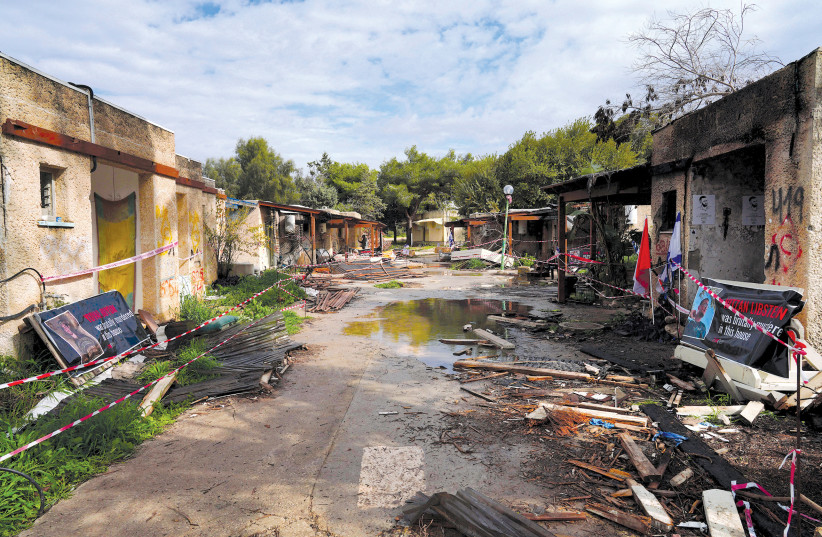Christian Zionist lawmakers have positioned themselves as a diplomatic Iron Dome for the Jewish state amidst a surge in antisemitism and a barrage of condemnation against Israel during the ongoing Gaza conflict.
“Faith-based diplomacy is Israel’s strongest weapon in our diplomatic arsenal,” said Israel Allies Foundation President Josh Reinstein.
In a show of solidarity, over 20 Christian lawmakers from around 20 countries visited the Jewish state this week as part of the Israel Allies Foundation’s Chairman’s Conference. High on their agenda was legislation to strengthen the tools at their country’s disposal to support Israel.
On Tuesday afternoon, the delegation signed a resolution on behalf of the leaders of the 53 Israel Allies Caucuses worldwide to speak out against Iran.
The resolution strongly condemns Iran for its role as a state sponsor of terrorism, particularly citing its involvement in the October 7 Hamas massacre.

It calls for immediate sanctions against the Islamic Revolutionary Guard Corps and reinstatement of sanctions on Iran due to its ties to terrorism and war crimes against Israel.
Additionally, it demands the release of hostages held by Hamas, recognizes Hamas as a terrorist organization, and declares Iran, Hamas, and affiliated groups as obstacles to peace in the Middle East.
The resolution also calls on Hamas to ensure aid reaches all civilians in Gaza, commits to promoting regional stability and economic security, and reaffirms Israel’s sovereign right to defend itself against terrorist threats.
Tuesday’s resolution was the third one signed by the delegation during their three-day trip, which spanned from March 3 to 5.
On Sunday, during a visit to southern Israel, the lawmakers pledged to work to defund and dismantle the United Nations Relief and Works Agency for Palestinian Refugees (UNRWA). Later that evening, in the Binyamin Regional Council headquarters, they declared that the Jewish people have the right to live in Judea and Samaria in peace and security.
The delegation committed to seeing the resolutions come to fruition in their countries as an act of faith and love for Israel.
“When we say we are with you, we stand with you,” said Liberia’s Christian Allies Caucus Chair Representative Moimah Briggs Mensah.
Advancing faith-based diplomacy throughout the years
Reinstein has dedicated over 15 years to advancing faith-based diplomacy for Israel. Over the past decade, numerous tangible successes have emerged, most notably the relocation of the United States embassy from Tel Aviv to Jerusalem in 2018.
Former US president Donald Trump’s decision to relocate the embassy was bolstered by solid evangelical support despite warnings from various foreign leaders about potential security escalations.
America’s initiative has inspired other world leaders to relocate their embassies, most as an act of faith.
Most recently, in September, Papua New Guinea opened a Jerusalem embassy. Papua New Guinea Prime Minister James Marape said at the ribbon cutting, “For us to call ourselves Christian, paying respect to God would not be complete without recognizing that Jerusalem is the universal capital of the people and the nation of Israel.”
Another example is Felix Tshisekedi, the President of the Democratic Republic of Congo and a devout Christian who served as chairman of the African Union and helped ensure Israel gained AU observer status in 2021.
Israel used to have observer status with the Organization of African Union until it disbanded in 2002 and was replaced by the African Union.
Last year, when the union threatened to rescind Israel’s status once again, the decision was delayed due to a powerful African Christian lobby, including the leaders of the local Christian Allies Caucuses.
More than 50% of Africans are Christians today, including in countries like South Africa, where, despite the government’s anti-Israel policies, Christian citizens continue to pray and defend the Jewish state.
In December, Liberia cast its vote alongside Israel and the United States, opposing a United Nations resolution designed to halt the conflict in Gaza. The majority religion in Liberia is Christianity; according to some surveys, it is as much as 86% of the population.
Reinstein said that the chairs of the Christian Allies Caucuses are actively engaged in advocating for pro-Israel legislation through faith-based diplomacy with Israel. Their work involves combating antisemitism and anti-Zionism and, more recently, addressing the dissolution of UNRWA.
“In these challenging times, the gathering of political leaders from across the globe to express solidarity with Israel is of critical importance,” Reinstein said. “Through dialogue, collaboration, and collective action, the Chairman’s Conference exemplifies a steadfast dedication to safeguarding shared values and translating faith-based support for Israel into real political action.”
MK Yuli Edelstein expressed similar sentiments when he spoke to the delegation on Monday evening: “Nothing during these challenging times is more encouraging than to know that we have friends like you.”
Hamas and Hezbollah continue to fire rockets at Israel, causing physical harm, death and destruction.
In the face of verbal and diplomatic attacks launched by anti-Zionists and Palestinian sympathizers against Israel, it should be reassuring to have steadfast support from Christian Zionists who stand ready to defend the Jewish state.
